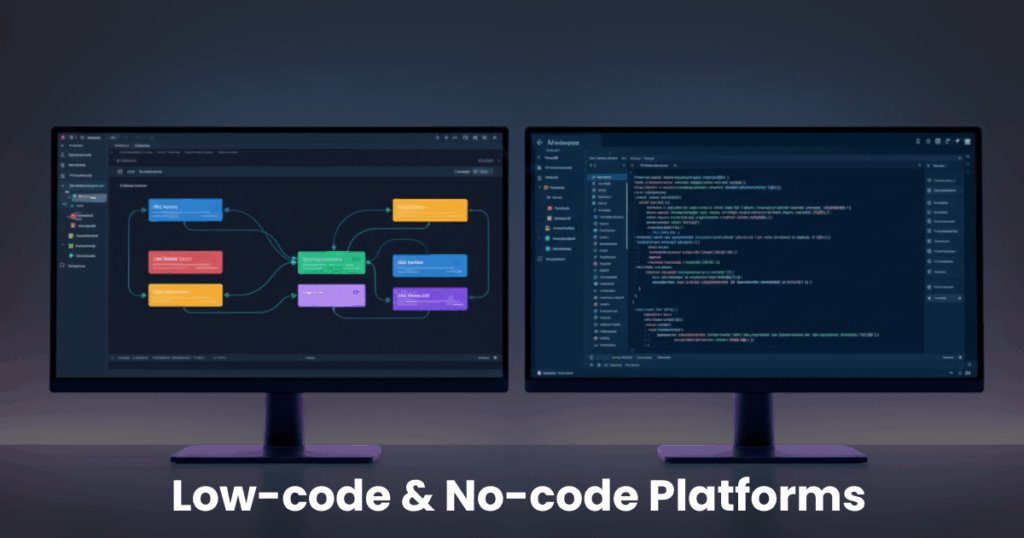Modern-day enterprises are under immense pressure to build and deploy digital solutions faster. The conventional app development methods offer to do the job well, but their cycles are longer, and require a considerable amount of coding. Hence, enterprises have been taking the leap forward and investing in Low-Code and No-Code (LCNC) platforms.
Interestingly, LCNC solutions offer a modern approach to the app development process. It helps teams to build reliable and high-performing apps easily by using drag-and-drop components and pre-built modules.
While it eliminates the need for investing in extensive coding skills, leaders also trust this solution to ensure compliance. Hence, the LCNC app development promises speed, security, and excellence.
However, to ensure apps are built right, many leading organizations also trust the expertise of a mobile app development services. To quickly scale capacity and fill skill gaps for these specialized technical roles, many companies utilize IT Staff Augmentation. They are proficient at helping teams deliver rapid application delivery without compromising on quality, security, or user experience.
In similar contexts, businesses may also rely on capabilities such as cloud integration consulting, workflow automation specialists, and AI agent development services to support intelligent process orchestration and system-level decision-making alongside low-code initiatives.
That being said, this article explores why businesses trust LCNC platforms to optimize their app development process. Moving ahead, we will also uncover its related challenges and solutions.
What are Low-code and No-code Platforms?

As leaders are keen to build and deploy apps faster, low-code and no-code platforms have emerged as a trusted solution. In essence, they are redefining the app development process by making it simple, effective, and cost-efficient.
Navigating through this subject, this section shares an in-depth understanding of low-code and no-code platforms.
Low-Code Apps
- This software development approach requires minimal coding knowledge to develop apps.
- It is most suited for technical and non-technical users in an organization.
- It offers higher flexibility as compared to no-code platforms, as coding changes can be made.
No-Code Apps
- These app development platforms require no coding.
- Instead, they have drag-and-drop tools to allow non-technical personnel to create visually attractive and engaging apps.
- It is interesting to note that while coding is not visible, these platforms do the coding for your teams in the backend.
Altogether, these modern innovations aim to help non-engineering professionals with little or no coding knowledge get applications started and running in no time. Moreover, they are simple, creator-friendly, and interactive.
This is one of the reasons why its adoption is increasing in organizations today. Moreover, by 2025, LCNC platforms are projected to grow to 37.39 billion, and they will rise to USD 264.40 billion by 2032, exhibiting a CAGR of 32.2% during this period.
Top Reasons Why Businesses Are Adopting Low-Code and No-Code Platforms?

Low-code and no-code platforms offer a simplistic app development process. Notably, they are able to deliver and optimize apps in less time and help enterprises navigate their journey towards digital transformation.
Also, with mobile app development services, they are all the more effective. That being said, let us understand why business leaders are keen to make LCNC platforms a cornerstone of modern software development.
1. Faster App Development and Launch
Instead of writing extensive code, teams now use LCNC platforms that offer the following to create and deploy applications at a rapid pace:
- Visual development environments,
- Pre-configured modules,
- Automated build pipelines
Moreover, they use auto-testing scripts, version control, and one-click deployment, along with pre-configured security policies.
Results: It enables speedier innovation, thereby reducing the duration of development cycles and iterations in the traditional process.
2. Easy to Use and Maintain
Low-code and no-code platforms are designed to integrate simplicity and efficiency in the overall app development process. As a result, their architecture has interactive elements that reduce the need for complex coding. These may include visual interfaces, drag-and-drop components, and pre-built logic blocks.
Results: It allows for easier workflow changes, design improvements, and more. Moreover, app updates and performance controls are reflected on centralized dashboards.
It also promotes real-time visibility, feedback, and improvements, which helps improve the quality of the apps. Overall, these platforms are very manageable for technical and non-technical personnel.
3. Improved Cost Effectiveness
As we know, traditional software development cycles rely on extensive coding. This implies more time and resources for the entire app development project. But with LCNC platforms that offer reusable modules (that can be custom-built) and visual workflows, the investment is relatively less.
Results: So now, even non-technical staff can work on apps, build them from scratch, and make changes easily when a new feature or update is needed.
Simply put, businesses can optimize their app development process by making the strategic choice of choosing LCNC platforms. These are a highly cost-efficient alternative for continuous innovation.
4. Improved Business Agility
Contrary to the traditional app development method, where necessary updates require long planning cycles and extensive coding, LCNC platforms are just built differently.
It enables teams to rapidly build app prototypes, develop automated workflows, and release new app features that can enhance their performance. So, if your app needs more engagement, new features can be added using LCNC apps to fulfill the purpose.
Results: These allow organizations to respond quickly to changing market demands and customer needs. As a result, low-code and no-code platforms offer higher agility and flexibility.
In this manner, LCNC enables development teams to collaborate, experiment, and innovate with apps at an unprecedented pace that matches today’s competitive market.
Reality Check: Top 3 LCNC App Development Concerns
While low-code and no-code platforms promise unmatched speed and simplicity, they also introduce a new set of business risks. Hence, understanding these concerns is the first step to adopting LCNC responsibly and keeping the innovation aligned with your organization’s goals.
That being said, here is a list of the top concerns that are associated with LCNC platforms.
1. Security and Access Control
It is undoubtedly true that these platforms make it easier for non-technical teams to build apps. But these might be unintentionally exposed to some vulnerabilities, such as weak authentication, misconfigured permissions, and unauthorized data access.
Solution: It is necessary for teams to choose LCNC tools with enterprise-grade security standards. Additionally, focusing on role-based access controls (RBAC) along with centralized monitoring can strengthen the security posture of LCNC apps.
2. Data Integrity and Governance
LCNC apps often integrate data from multiple systems, such as CRMs, ERPs, and modern-day cloud databases. But at all times, data needs to be highly secure to avoid any compliance complications and inconsistencies.
Solution: A trustworthy way to ensure data integrity can be to establish clear governance guidelines for your organization. Furthermore, enforcing data validation norms and integrating LCNC apps with a unified data architecture can help maintain high data quality.
3. Managing Shadow IT
Oftentimes, employees use LCNC platforms to create apps outside of IT’s visibility to manage their workload. Since these have an unmonitored data flow, they can be a weak link for security threats.
Solution: To manage this concern, companies need a proactive management of such apps through strong oversight and centralized monitoring. Moreover, sharing guidelines with employees to align all apps with the IT is a necessary step in the process of strengthening and securing the modern enterprise architecture.
Final Thoughts
Low-code and no-code platforms are redefining how modern apps are developed and deployed. It also helps break free from the traditional app development barriers that are halting your growth.
Clubbed with a mobile app development services expert, these modern solutions can even be highly agile and cost-efficient.
Hence, the degree of impact that the LCNC app development approach has on your digital transformation looks promising, thereby blending speed with scalability. So, it is not an afterthought to embrace them, but a roadmap to building faster and smarter apps in less time.




